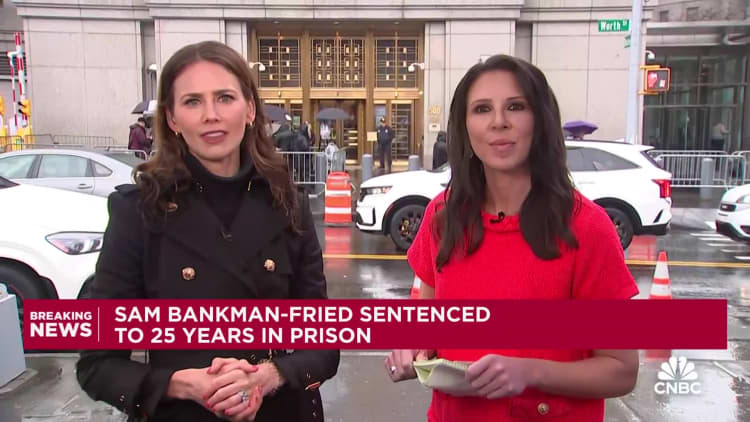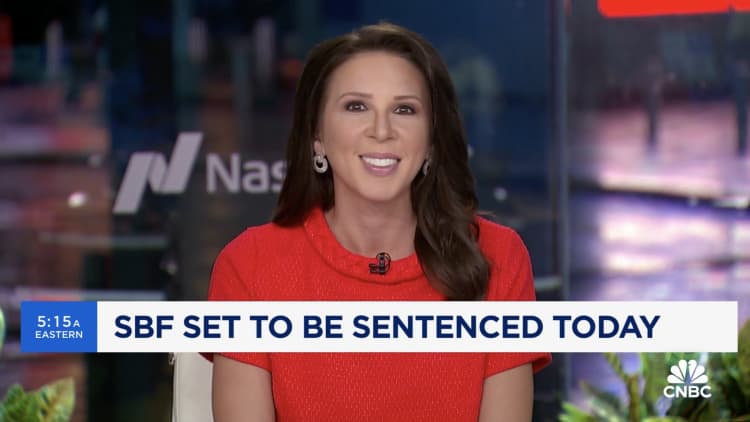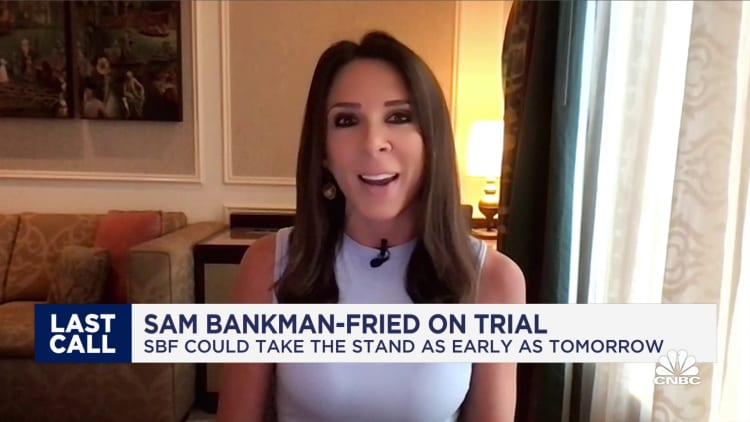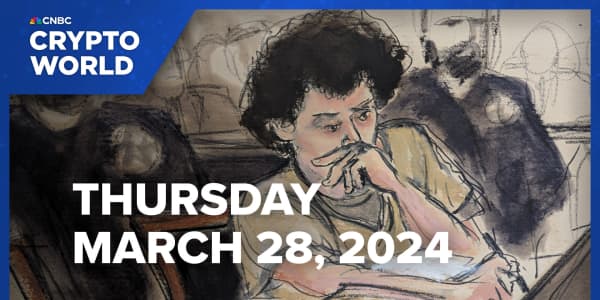While prosecutors are requesting that FTX founder Sam Bankman-Fried spend 40 to 50 years in prison for his crimes, the defense team is urging the judge to consider a sentence that's roughly 90% shorter.\
Bankman-Fried's fate will be announced in Manhattan on Thursday morning by Judge Lewis Kaplan, who presided over the monthlong trial in November. Bankman-Fried was found guilty of seven charges tied to the collapse of crypto exchange FTX and the roughly $10 billion of customer deposits that went missing.
The hope for Bankman-Fried's team is that Kaplan takes into account the increased likelihood that FTX customers will be able to recoup most, if not all, of the money they lost when the exchange spiraled into bankruptcy in 2022.
Lawyers representing the bankruptcy estate of FTX told a judge in Delaware last month that they expect to fully repay customers and creditors with legitimate claims. Bankruptcy attorney Andrew Dietderich, who works with FTX's new leadership team, said "there is still a great amount of work and risk" ahead in getting all the money back to clients, but that the team has a "strategy to achieve it."
It was a potentially dramatic change in the narrative surrounding FTX's collapse 16 months ago. At the time, it was believed that many thousands of customers — reportedly up to a million — collectively lost billions of dollars that would be unrecoverable due to the lightly regulated and unsecured nature of the crypto industry. Those clients faced the real possibility that the vast majority of their money had evaporated, just like in other cases of hedge funds and lenders that failed during the so-called crypto winter of 2022.

Much of the government's successful case against Bankman-Fried hinged on convincing the jury that the defendant had stolen billions of dollars worth of FTX customer money to make risky bets at Alameda.
For months, as FTX has wound its way through a Delaware bankruptcy court, new CEO John Ray III and his team of restructuring advisors have been clawing back cash, luxury property, and crypto, as well as tracking down missing assets. They've already collected more than $7 billion, and that doesn't include valuables like $26 million in gifts and property to Bankman-Fried's parents, or the $700 million handed over to K5 Global and founder Michael Kives, who invested FTX cash in companies like SpaceX that have since increased in value.
Bankman-Fried's defense team has asked the court for a sentence in the range of 63 to 78 months. Beyond the fact that he's a "first time, nonviolent offender," attorneys for the FTX founder largely lean on the argument that Bankman-Fried's risky bets paid off and the bankruptcy estate expects to fully repay FTX customers.
It's a story that Bankman-Fried was trying to sell as he awaited trial.
"FTX US remains fully solvent," Bankman-Fried wrote in a Substack post on Jan. 12, 2023, while he was under house arrest at his parents' home in Palo Alto, California. He said the exchange "should be able to return all customers' funds."

One key asset in FTX's portfolio is its stake in artificial intelligence startup Anthropic. Late last week, FTX's bankruptcy estate struck a deal with a consortium of buyers to sell the majority of its Anthropic holdings for $884 million. Under Bankman-Fried's leadership, FTX invested $500 million in the startup in 2021 before the boom in generative AI. The company's valuation hit $18 billion in December 2023, which would put FTX's roughly 8% stake at about $1.4 billion.
During Bankman-Fried's trial, Kaplan denied the defense's request that it be permitted to say that FTX's investment in Anthropic was a smart bet.
'Still guilty'
Renato Mariotti, a former prosecutor in the U.S. Justice Department's Securities and Commodities Fraud Section, told CNBC that the more money the estate is able to recover for clients, the better for Bankman-Fried.
"If true, that is relevant and the judge is required to consider victim restitution at sentencing," Mariotti said. "But even if victims weren't harmed, he is still guilty of the offense."
Mariotti said he expects the sentence to fall somewhere in between what the prosecution and defense are asking, predicting it will be "at least 20 to 25 years."
In addition to the Anthropic gains, FTX customers can look at the rebound in crypto for signs of optimism. Bitcoin is trading at close to $70,000, up from less than $17,000 at the time of FTX's collapse.
In September, the bankruptcy team released a status report showing that FTX had $3.4 billion worth of digital assets, with over $1.1 billion coming from its investment in crypto coin Solana. In the defense's letter to the court filed last month, attorneys note a sizable increase in the value of FTX's Solana stake, saying that as of Feb. 26, the estate saw a roughly $4 billion increase over the last six months thanks to the token's appreciation.
Solana fits into a category of so-called "Sam coins," a group that also includes Serum, a token created and promoted by FTX and Alameda. Solana saw a huge run-up of late, climbing more than eightfold since the end of September.
Meanwhile, FTX's bitcoin stash, which was worth $560 million at the time of the September report, when the coin was trading at around $25,000, has seen a significant uptick as well. Bitcoin's value has increased by around 180% since then.
For FTX customers, being made whole, according to a judge's ruling, means getting the cash equivalent of what their crypto was worth in November 2022. In other words, they're not seeing any of the upside of FTX's investments or being given virtual coins that would allow them to cash out at higher valuations.
Braden Perry, who was once a senior trial lawyer for the Commodity Futures Trading Commission, told CNBC that Bankman-Fried faces at least 70 months in prison based on his base level offense, number of victims, sophisticated means and leadership role — even if there's no monetary loss to the victims. The massive losses that were originally expected would suggest 30 years to life, Perry added.







